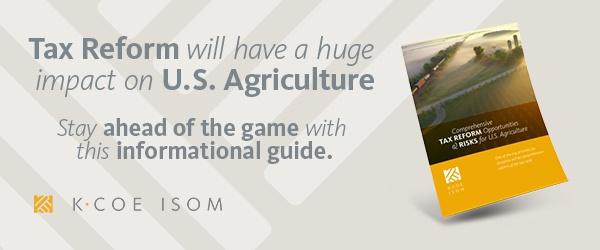One of the top priorities for Congress will be comprehensive reform of the tax code.
One of the top priorities for Congress in 2017 and 2018 will be comprehensive reform of the tax code.
The food and agriculture industries will need to carefully analyze these sweeping proposals and work hard to ensure that the rewrite of the tax code strengthens and does not disadvantage U.S. agriculture.
We expect the U.S. House Ways and Means Committee will introduce its tax reform bill as early as the first quarter of 2017. The Senate Finance Committee will likely take longer to craft and introduce legislation and is more likely to move forward in a bipartisan fashion. While the House and the White House will strive to pass legislation during 2017, we expect that comprehensive tax reform is more likely to become law in 2018 prior to the mid-term elections.
Republican Tax Reform Blueprint
In the U.S. House of Representatives, legislation will be based on the Tax Reform Blueprint released by Speaker Ryan in June 2016. You can download a copy of the Blueprint here.
The Blueprint proposes to lower and flatten corporate and individual rates, create a new business tax rate for pass-through entities, and repeal the estate tax. It also allows for immediate expensing of qualified purchases and capital expenditures (excluding land), but would limit the ability to carry forward net operating losses, eliminate the ability to carry back net operating losses, and limit deduction of interest expenses.
One of the most significant changes proposed by the Blueprint is to incorporate “border adjustability” into the tax code. Under border adjustability, revenue accruing to a company from U.S. exports is not treated as income. Conversely, companies selling imports into the U.S. will pay income tax on such revenue. Further, the cost to U.S. companies of imported goods, such as fertilizer or farm equipment, would likely not be deductible as business expenses.
While some elements of the Blueprint could benefit agriculture, given the complexity and sweeping nature of the proposed changes, a detailed analysis based on actual legislative language will be necessary to determine how tax reform will impact the food and agriculture industries.
Key Questions
As Congress debates tax reform, some key questions include:
- Would border adjustability strengthen the U.S. dollar, lead to retaliatory tariffs or otherwise weaken the competitiveness of agricultural exports?
- Would agricultural producers be able to take advantage of border adjustability if they sell to domestic processors?
- How much would immediate expensing of qualified purchases help agricultural operations if loss carry-forwards and carry-backs and interest deductions are limited?
- What will be the effect on pass-through entities of establishing a new business tax rate?
- Will Congress limit the ability of agricultural operations to use cash accounting?
- Would comprehensive tax reform raise or lower effective rates for agriculture?
How K·Coe Isom Can Help
At K·Coe Isom, we are working closely with key members of Congress to make sure that tax reform strengthens America’s agricultural economy. If cash accounting is important to you, please ask us about Farmers for Tax Fairness (www.FairFarmTax.org) and how you can join this effort.
Beyond cash accounting, if you run a significant agricultural business or are part of an agricultural trade association, there are multiple ways we can help you prepare for tax reform. Click the link below to learn more and request a consultation with a K·Coe Isom advisor.

